We would like to cordially invite you to the 2nd symposium of the BU’s Interdisciplinary Neuroscience Research Centre on next Monday the 16th of January 2023 from 9:00-13:00 at the Inspire Lecture Theatre, Fusion Building first floor (room updated).
The symposium is entitled “New Frontiers in Neuroscience: Neuroimaging and Integrative Multi-Sensing Methods”. We will focus on these two themes from a cross-disciplinary angle, leveraging synergies between different departments at BU and our collaborators in other universities, industry, charities, and at the NHS. We think that this is a good opportunity to have informal discussions on grant proposals, also to explore shared interests with our external guests.
The schedule is:
9:00-9:15 Welcome and coffee.
9:30. Keynote talk: Prof. Mavi Sanchez-Vives, Biomedical Research Institute IDIBAPS, Barcelona (Leader of Human Brain Project Work Package 2 -Networks underlying brain cognition and consciousness-). “Brain States and Consciousness Studies in the Human Brain Project”. This talk will be online, projected on the screen. All the rest of the talks will be presential.
10.20-10:40. Coffee.
10:40-11:40. Session I. Integrating Multi-sensing approaches and Industrial Applications.
- Prof. Fred Charles (Creative Technology, FST, BU). “Multimodal Immersive Neuro-sensing approaches -introduction to the MINE cluster”.
- Dr. Ifigeneia Mavridou (EmteqLabs, Sussex Innovation Centre). “Investigating affective responses to VR environments”.
- Dr. Federica Degno (Psychology Department, FST, BU). “Co-Registration of Eye Movements and EEG”.
11.40 -12.00. Coffee and grants discussion.
12.00-13:00. Session II. Neuroimaging and Clinical Neuroscience. Concluding remarks.
- Dr. Ruth Williamson (Deputy Chief Medical Officer, UHD; Consultant Radiologist). “The effect of cold-water immersion on brain function”.
- Prof. Carol Clark (Rehabilitation and Sport Sciences, HSS, BU). “Measuring the brain structure, function and cognition of women currently engaged in sporting activities”.
- Prof. Brigitte Vollmer (Southampton General Hospital, Southampton University). “Neurodevelopmental trajectories and neural correlates in children with neonatal Hypoxic Ischaemic Encephalopathy”.
Please, feel free to forward this email to any colleague/students who may be interested. If you have any queries, please do not hesitate to contact any of us (Ellen Seiss, eseiss@bournemouth.ac.uk, Emili Balaguer-Ballester eb-ballester@bournemouth.ac.uk). For those of you who cannot make it, we will use Zoom, and it will be recorded (please see the Zoom link below this post).
After the event and having some lunch (can be bought in the same building) there are follow-up activates, if you wish to:
- In the same lecture theatre, at 14h, there will be a very interesting talk, sponsored by the MINE cluster-Department of Psychology seminars, by Dr. Benjamin Schoene (Universität Osnabrück), entitled “The Brain in Virtual Reality: A Novel Perspective on Psychological Science”.
- The talk will be followed by a visit to the Multimodal Immersive Neuro-sensing lab for natural neuro-behavioural measurement, which is just next to the Fusion Building (MINE lab, Tolpuddle Annex 1, TAG02) .
Thank you very much, we are looking forward to seeing you on Monday.
Kind regards,
Ellen and Emili

Emili Balaguer-Ballester is inviting you to a scheduled Zoom meeting. Join Zoom Meeting
https://bournemouth-ac-uk.zoom.us/j/86099638587?pwd=aFNETFVCNXY5MW1jZG5aOFpJVTZ3QT09
Meeting ID: 860 9963 8587
Passcode: irf*he$6
One tap mobile
+13092053325,,86099638587#,,,,*83880856# US
+13126266799,,86099638587#,,,,*83880856# US (Chicago)
Dial by your location
+1 309 205 3325 US
+1 312 626 6799 US (Chicago)
+1 346 248 7799 US (Houston)
+1 360 209 5623 US
+1 386 347 5053 US
+1 507 473 4847 US
+1 564 217 2000 US
+1 646 558 8656 US (New York)
+1 646 931 3860 US
+1 669 444 9171 US
+1 669 900 9128 US (San Jose)
+1 689 278 1000 US
+1 719 359 4580 US
+1 253 205 0468 US
+1 253 215 8782 US (Tacoma)
+1 301 715 8592 US (Washington DC)
+1 305 224 1968 US
+44 203 901 7895 United Kingdom
+44 208 080 6591 United Kingdom
+44 208 080 6592 United Kingdom
+44 330 088 5830 United Kingdom
+44 131 460 1196 United Kingdom
+44 203 481 5237 United Kingdom
+44 203 481 5240 United Kingdom
Meeting ID: 860 9963 8587
Passcode: 83880856
Find your local number: https://bournemouth-ac-uk.zoom.us/u/kdtV9nkL8X
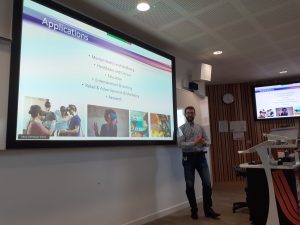
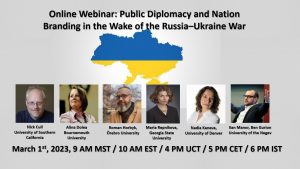
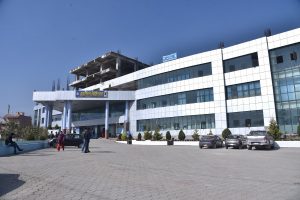 As part of the Erasmus+ exchange, Professors Vanora Hundley and Carol Clark were recently invited to discuss the importance of communication with nurses at
As part of the Erasmus+ exchange, Professors Vanora Hundley and Carol Clark were recently invited to discuss the importance of communication with nurses at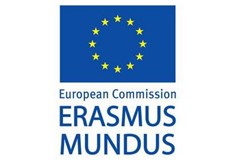 Manmohan Memorial Hospital in Kathmandu, Nepal.
Manmohan Memorial Hospital in Kathmandu, Nepal.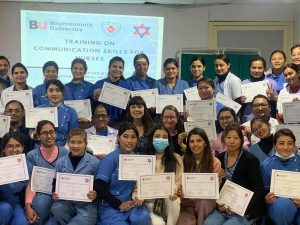 However, all reported that finding time to stop and listen to patients could be a challenge when the hospital was busy. The group participated in a number of exercises, which included role-playing to understand how it feels to be a patient entering the hospital.
However, all reported that finding time to stop and listen to patients could be a challenge when the hospital was busy. The group participated in a number of exercises, which included role-playing to understand how it feels to be a patient entering the hospital.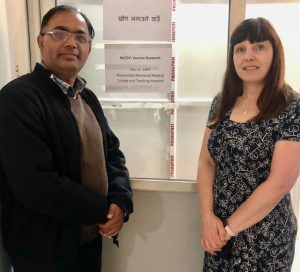 Dr Sujan Marahatta explained the process and discussed how the hospital was contributing to this important research.
Dr Sujan Marahatta explained the process and discussed how the hospital was contributing to this important research.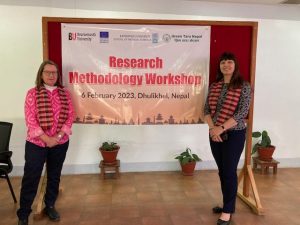
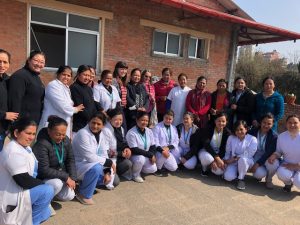



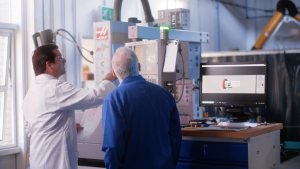
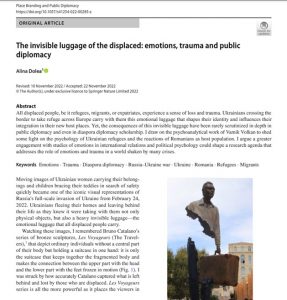
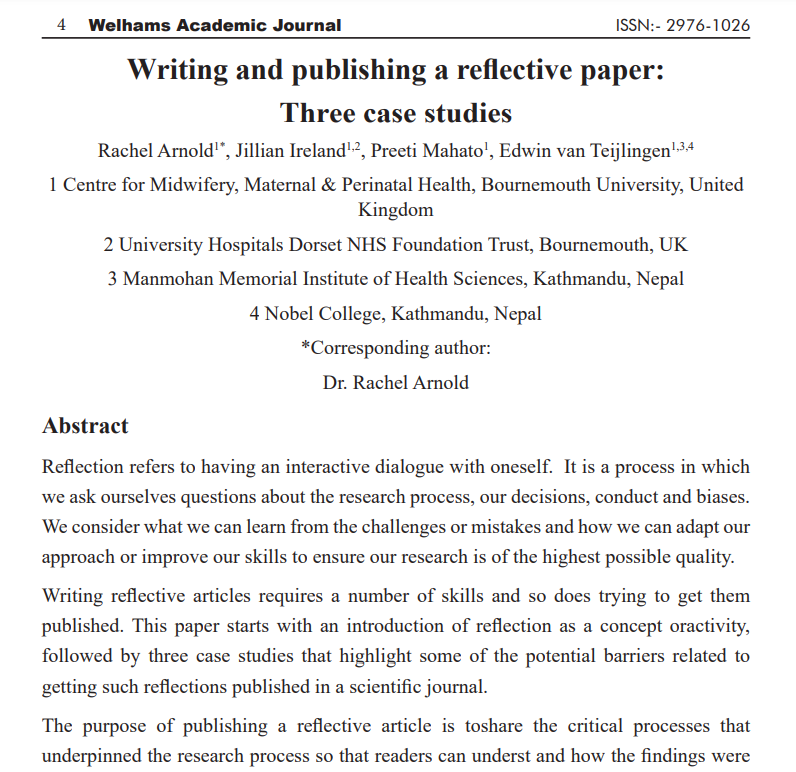

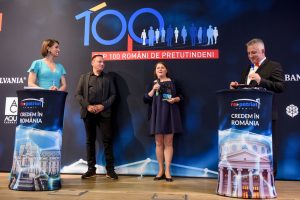
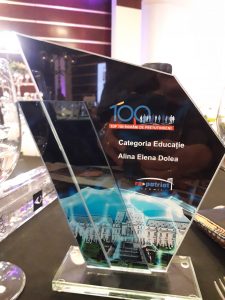
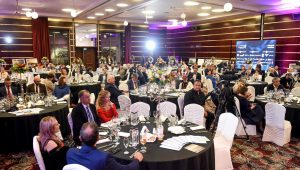
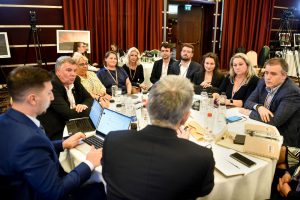
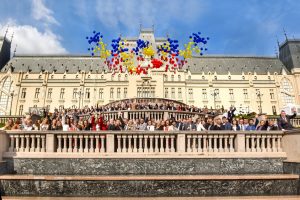
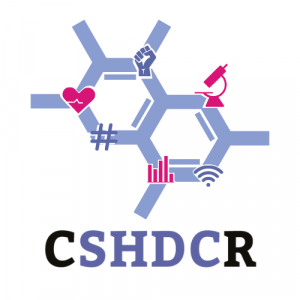 The Centre for Science, Health, and Data Communication Research invites you to our Autumn-Winter 2022-23 research series. These talks are open to the public, and encompass topics on representations of bodies in the media, managing your health data, immersive media, and community responses to suicide.
The Centre for Science, Health, and Data Communication Research invites you to our Autumn-Winter 2022-23 research series. These talks are open to the public, and encompass topics on representations of bodies in the media, managing your health data, immersive media, and community responses to suicide.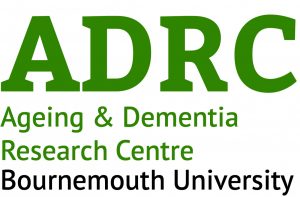












 New weight change BU paper
New weight change BU paper One week to go! | The 16th Annual Postgraduate Research Conference
One week to go! | The 16th Annual Postgraduate Research Conference Geography and Environmental Studies academics – would you like to get more involved in preparing our next REF submission?
Geography and Environmental Studies academics – would you like to get more involved in preparing our next REF submission? Congratulations to three former BU staff
Congratulations to three former BU staff Applications are now open for 2025 ESRC Postdoctoral Fellowships!
Applications are now open for 2025 ESRC Postdoctoral Fellowships! Horizon Europe – ERC CoG and MSCA SE webinars
Horizon Europe – ERC CoG and MSCA SE webinars ERC grants – series of webinars
ERC grants – series of webinars MaGMap: Mass Grave Mapping
MaGMap: Mass Grave Mapping Last reminder – MSCA Postdoctoral Fellowships 2024 internal deadline next week
Last reminder – MSCA Postdoctoral Fellowships 2024 internal deadline next week